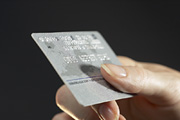The Six Debt Triggers for Women
by www.SixWise.com
The average American is over $7,100 in debt (not including
a mortgage) and three out of five families can't afford to
pay off their credit cards each month.
Still, as a culture we keep spending-on clothing, luxury
cars, gourmet meals, electronics, CDs, you name it-and some
would surely argue that spending is an integral part of being
American (even President Bush asked Americans to keep spending
as our patriotic duty after the September 11th attacks).
|

If you're a woman who loves to shop, recognizing your
spending triggers is essential to staying out of debt.
|
But for the 17 million Americans who simply can't control
how much they shop (that's more than one in 20 of us), this
spending quickly turns from a pastime into a problem. And
it's a problem that affects, overwhelmingly, women. About
90 percent of shopaholics are female.
It's a powerful problem because, for women, shopping is not
just about getting a new pair of jeans. It's an emotional
experience, tied to feelings of pleasure, power, guilt and
entitlement, that can drive an otherwise "together"
woman into debt and even bankruptcy.
Following are six of the more common triggers that can start
you spiraling downward financially. Being aware of them, and
whether they're happening to you (be honest!), is the first
step to regaining, or keeping, your financial security.
1. "I Deserve It." Using Shopping as a Reward
You're working hard, spending long days in the office or
taking care of the kids, and you deserve something nice. But
while a new pair of earrings here and there won't break the
bank, you soon may find yourself wanting more extravagant
items to reward your hard work.
Instead of heading to the mall to make yourself feel good
after a hard day's work, reward yourself with something that
doesn't cost much at all: a walk outside, a long bubble bath,
listening to music or reading that book you've been meaning
to get to.
|

Many women buy things to make themselves feel better
after having a bad day.
|
2. Depression, Sadness or Loneliness: "These New
Shoes Will Make me Feel Better."
If you're unhappy with your life-your work, your relationship,
your family-or you've just had a fight with your best friend,
you may be driven to shop.
Buying something new makes you feel good, but the pleasure
is fleeting so you must buy more and more just to feel normal.
And you're able to justify your spending because, after all,
you deserve to feel good, don't you?
This cycle is similar to that of binge eating or gambling-it's
a brief high that takes your mind off the real underlying
problem.
Some experts are so convinced that compulsive shopping is
a type of mental illness that they're experimenting with antidepressants
to treat the obsession. One Stanford study, led by psychiatrist
Lorrin Koran, found that of 24 compulsive shoppers, 60 percent
were helped by taking an antidepressant. Said Koran, "It
meant they didn't turn on the shopping channel anymore ...
It meant they could go to the mall and not buy things they
didn't need. It was a tremendous relief."
But rather than popping a pill, which could exchange one
addiction for another, it seems the real solution is to address
the reasons why you're sad, lonely, depressed, etc. in the
first place.
3. Fear of Missing Out on a Great Deal: "This skirt
was $750 ... Now it's Only $350!"
Do you buy things just because they're on sale, or feel an
overwhelming urge to go to your favorite store just in case
you might miss a good deal? If so, bargains are a major spending
trigger for you. If you go over your budget to buy something
you don't need just because of a markdown, you're not really
saving money.
It's great to take advantage of specials on useful items
you need or those occasional luxuries you were in the market
for anyway. But even if those designer shoes you just noticed
"used to cost $650 are half off" you're still spending
$325!
4. Recreation: "If I Didn't go Shopping, I Don't
Know What I'd Do."
Shopping is a social activity and one that many women (and
increasing numbers of men) enjoy. But if you find yourself
spending money simply for a lack of something better to do,
it's time to find a new pastime. Try something away from the
shopping mall, like taking dance lessons, entertaining friends
at home or taking up an outdoor hobby like biking or hiking.
5. Using Credit Cards to Live Beyond Your Means: "I'll
Pay it Off Later."
Rather than coming up with a monthly budget, many women,
especially those in their 20s who've just gotten their first
real job (and real paychecks), spend indiscriminately and
use credit cards to make ends meet at the end of the month.
This is easily rationalized when we know that "even
though there's a big balance on my credit cards, I can just
make the minimum monthly payments."
This will catch up with you fast, though, and soon you'll
have a looming credit balance that could take 10 years or
more to pay off. Being aware of your personal spending triggers,
and avoiding them, is one of the best ways to take control
of your spending. It is worth remembering this principal:
if you don't spend it now, you don't have to pay for it later!
Recommended Reading
Top
Ten Ways NOT to Throw Your Money Away in 2005
Kids
and Money: 5 Keys to Teaching Kids Money Management Skills
Sources
Reader's
Digest March 2005
MSN
Money: You Might be a Shopaholic
iVillage:
5 Common Debt Triggers
CNN
Money: Are You a Shopaholic?